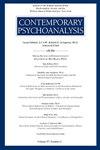Lost in a Universe of No Inherent Meaning: Psychoanalysis and Existentialism
IF 0.2
4区 心理学
Q4 PSYCHIATRY
引用次数: 0
Abstract
Abstract Addressing the patient’s anxieties about the meaning of life and death as integral phenomena of the life cycle is not commonly discussed in the analytic literature. A central dilemma of analytic work is the effort to facilitate change in the life of a suffering patient while also bearing in mind the inescapable human destiny, i.e., the certainty of death. All too often, these factors remain in the background while dealing with other conflicts or misfortunes. The analyst, like the patient, is aware of the brevity of life and is susceptible to the same fate, and thus may feel defenseless, helpless, and limited in what can be offered. This article incorporates the existentialist thinking of Camus on the subject and illuminates it with analytic work with unspoken trauma of a second-generation Holocaust survivor.迷失在没有内在意义的宇宙中:心理分析与存在主义
摘要将患者对生与死的意义的焦虑作为生命周期的整体现象,在分析文献中并不常见。分析工作的一个核心困境是努力促进痛苦患者生活的改变,同时牢记人类不可避免的命运,即死亡的必然性。在处理其他冲突或不幸时,这些因素往往会留在背景中。分析师和患者一样,意识到生命的短暂,容易受到同样的命运的影响,因此可能会感到无助、无助和所能提供的东西有限。本文将加缪的存在主义思想融入到这一主题中,并以一位第二代大屠杀幸存者的心照不宣的创伤作为分析作品加以阐释。
本文章由计算机程序翻译,如有差异,请以英文原文为准。
求助全文
约1分钟内获得全文
求助全文

 求助内容:
求助内容: 应助结果提醒方式:
应助结果提醒方式:


